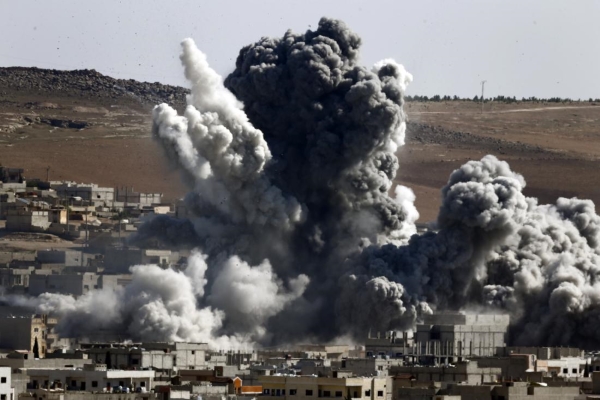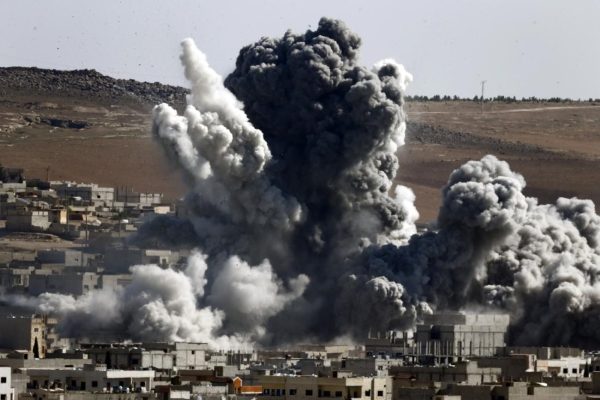
Smoke and dust rise over Syrian town of Kobani after an airstrike, as seen from the Mursitpinar crossing on the Turkish-Syrian border in the southeastern town of Suruc in Sanliurfa province October 22, 2014. REUTERS/Kai Pfaffenbach (TURKEY - Tags: MILITARY CONFLICT POLITICS) - RTR4B54G

By: Middle East Eye
Source: Middle East Eye
Israel said it launched multiple air strikes against air defences and Iranian targets in Syria on Saturday after the Syrian army shot down an Israeli F-16 that crashed in northern Israel in a major escalation of tensions.
Israeli Prime Minister Benjamin Netanyahu said that Israel sought peace but would continue to defend itself against Iran.
Lebanese Shia movement Hezbollah hailed Syria’s air defences after they downed the Israeli jet, saying it marked the start of a “new strategic era”.
“This is the beginning of a new strategic era which puts an end to the violation of Syrian airspace and territory,” Hezbollah said in a statement published by Lebanon’s ANI news agency.
Earlier in the day, a Syrian missile downed the Israeli warplane returning from a bombing raid on Iran-backed positions in Syria in the most serious confrontations yet between Israel and Iranian-backed forces based across the border.
Netanyahu said he had spoken with Russian President Vladimir Putin. “I reiterated to him our obligation and right to defend ourselves against attacks from Syrian territory. We agreed coordination between our armies would continue,” Netanyahu said in a televised statement.
US Pentagon spokesman Adrian Rankine-Galloway said: “Israel is our closest security partner in the region and we fully support Israel’s inherent right to defend itself against threats to its territory and its people.”
Israel said it had sent its jets into Syria after shooting down an Iranian drone flying over Israeli territory earlier on Saturday.
Still, both Israel and Syria signalled they were not seeking wider conflict, even as Netanyahu rushed to military headquarters in Tel Aviv for consultations and the pro-Assad alliance pledged a strong response to any Israeli “terrorist action”.
Russia’s foreign ministry said on Saturday that Moscow, whose forces began intervening on behalf of Assad in 2015, was seriously concerned by the latest developments in Syria. It urged both sides to exercise restraint and avoid escalation.
“My impression is that it seems to be contained at this point,” said a Western diplomat in the region. “I don’t think anybody wants to escalate further.”
“Twelve targets, including three aerial defense batteries and four Iranian targets that are part of Iran’s military establishment in Syria were attacked,” the Israeli military said in a statement.
“During the attack, anti-aircraft missiles were fired towards Israel, triggering alarms that were heard in Northern Israel,” the military said.
Israeli military spokesman Jonathan Conricus told journalists in a phone conference the Syrians and Iranians were “playing with fire” but Israel was “not looking to escalate the situation”.
“This is the most blatant and severe Iranian violation of Israeli sovereignty in the last years,” Conricus said, referring to what he described as an Iranian drone entering Israeli airspace from Syria.
“That’s why our response is as severe as it is.”
The military alliance fighting in support of Assad said on Saturday that Israel will witness a “severe and serious” response to its “terrorism” from now on.
In a statement, the alliance said Israeli claims that a drone entered Israeli airspace were a “lie”.
The statement said Israel attacked a drone base in central Syria. The alliance added that drones had left the T4 air base in the morning to conduct routine operations against Islamic State in the Syrian desert.
“When the base was targeted our aircraft were still flying over the town of Sokhna, towards the desert,” the statement said. Sokhna is a town northeast of the city of Palmyra in central Syria.
“Reports of downing an Iranian drone flying over Israel and also Iran’s involvement in attacking an Israeli jet are so ridiculous … Iran only provides military advice to Syria,” Iranian state TV quoted Iran’s Foreign Ministry spokesman Bahram Qasemi as saying.
Syrian state media reported two separate Israeli attacks.
In the first one, a military source said Syrian air defences had opened fire in response to an Israeli act of “aggression” against a military base, hitting “more than one plane”.
Later, Syrian state media said air defences were responding to a new Israeli assault and air defences had thwarted attacks on military positions in southern Syria.
Iran’s expanding clout during Syria’s nearly seven-year-long war, including deployments of Iran-backed forces near the Golan frontier, has raised alarm in Israel, which has said it would act against any threat from its regional arch-enemy Tehran.
The clashes marked a dangerous new confrontation between the international powers caught up in Syria’s seven-year-old war.
Iranian and Iran-backed Shia forces, including Lebanon’s Hezbollah, have deployed widely in support of Assad.
“Iran believes Syria has the right to legitimate self-defence. To cover their crimes in the region, Israeli officials are resorting to lies against other countries,” foreign ministry spokesman Bahram Ghasemi told AFP on Saturday.
“The allegations regarding surveillance by an Iranian drone are too ridiculous for words.”
‘Massive’ anti-fire
Israel said one of its attack helicopters shot down an Iranian drone at around 4.30am (0230 GMT) that had come from Syrian into Israel. “In response, the IDF [Israel Defence Forces] targeted Iranian targets in Syria,” the military said.
Conricus said a “substantial” number of Israeli warplanes on the mission had come under “massive Syrian anti-air fire” and only one Israeli jet was harmed.
The F-16 came down in a field near the northern Israeli village of Harduf, television footage showed, and one of the pilots was injured as they ejected, the military said.
David Ivry, a former Israeli Air Force chief, told Reuters he believed it was the first time an Israeli F-16 had been brought down since Israel began using the jets in the 1980s.
“We don’t know if the pilots ejected because of the [Syrian] fire,” Conricus said. It was also unclear at what stage of the mission they ejected, he said, “but it is of extreme concern to us if they were shot down”.
Flights temporarily suspended
Tensions have also spiked across the frontier between Israel and Lebanon over Israeli plans for border wall, and Lebanese plans to exploit an offshore energy block which is partly located in disputed waters.
The Syrian Observatory for Human Rights said Israel had targeted areas in the countryside southwest of Damascus, near the Syrian-Lebanon border west of Damascus and in the eastern countryside of Homs province for several hours since dawn.
One set of raids hit positions belonging to the Syrian government and its allies in central Syria around the T4 airbase and in the Homs desert, the Britain-based Observatory said.
It said another set of raids hit southwest of Damascus, and another hit around the Damascus-Beirut highway near the border with Lebanon.
In Israel, uniformed military personnel could be seen gathered around the burnt and tangled metal in Harduf by mid-morning, with what appeared to be white foam on the surrounding grass. Others knelt in the grass, inspecting pieces of the jet.
Rocket alert sirens sounded in the Israeli-held Golan Heights and in northern Israel and there were no reports of casualties.
Flights in to Israel’s main airport near Tel Aviv were suspended for about 15 minutes and take-offs were held for about 20 minutes on Saturday morning. “Ben Gurion Airport is now operating as usual,” Israeli Airport Authority spokesman Ofer Lefler said.
The airport’s online live flight schedule showed flights were departing and landing.



